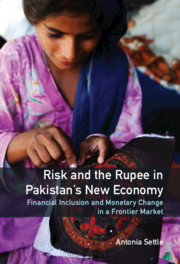 Risk and the Rupee in Pakistan's New Economy
Risk and the Rupee in Pakistan's New Economy Published online by Cambridge University Press: 31 March 2020
As discussed in Chapter 4, finance theory informs the approach taken by this study to households by identifying volatility as a cost burden of risk and identifying potential risk management strategies through portfolio allocation. In applying this micro-level analysis to households in Pakistan, evidence of monetary volatility as a substantive concern for ordinary people is sought out. Where found, such findings help to substantiate the argument that the liberalisation of money and markets and consequent exposure of money to global liquidity has generated meaningful change in money and the monetary environment.
This chapter discusses how, by drawing on field interviews, the study seeks out evidence of the substantive experience of risk attached to the liberalised rupee amongst households and in local bazaars. The chapter opens with a review of existing methodologies for interrogating household finances before setting out the methods utilised in field interviews for this study. The second part of the chapter systematically lays out the findings from field interviews in raw form. Worked in with the macro analysis from chapters prior, secondary fieldwork and newspaper articles, these findings are analysed in Chapter 6 to produce the conclusions of the final two chapters.
The field interviews thus inform the analysis of the monetary environment in Pakistan yet the interviews do not seek to unambiguously prove certain findings. The intention is not to fully scope the dimensions of alternative ‘currencies’, but to identify the ways in which the conventional understanding of the pre-eminence of state money as means of exchange, store of value and unit of account is being challenged in often ad hoc but quite comprehensive ways. Hence, the field interviews do not seek to establish a schema of risk management strategies through proportional sampling and a rigorous quantitative survey. Neither do they seek to develop an ethnographic description of the subjective and culturally mediated experience of financial risk. Rather, the field interviews seek to open up the question of money and globalisation to further analysis by exploring disruptions to mainstream assumptions about money and its governance in the field.
To save this book to your Kindle, first ensure no-reply@cambridge.org is added to your Approved Personal Document E-mail List under your Personal Document Settings on the Manage Your Content and Devices page of your Amazon account. Then enter the ‘name’ part of your Kindle email address below. Find out more about saving to your Kindle.
Note you can select to save to either the @free.kindle.com or @kindle.com variations. ‘@free.kindle.com’ emails are free but can only be saved to your device when it is connected to wi-fi. ‘@kindle.com’ emails can be delivered even when you are not connected to wi-fi, but note that service fees apply.
Find out more about the Kindle Personal Document Service.
To save content items to your account, please confirm that you agree to abide by our usage policies. If this is the first time you use this feature, you will be asked to authorise Cambridge Core to connect with your account. Find out more about saving content to Dropbox.
To save content items to your account, please confirm that you agree to abide by our usage policies. If this is the first time you use this feature, you will be asked to authorise Cambridge Core to connect with your account. Find out more about saving content to Google Drive.